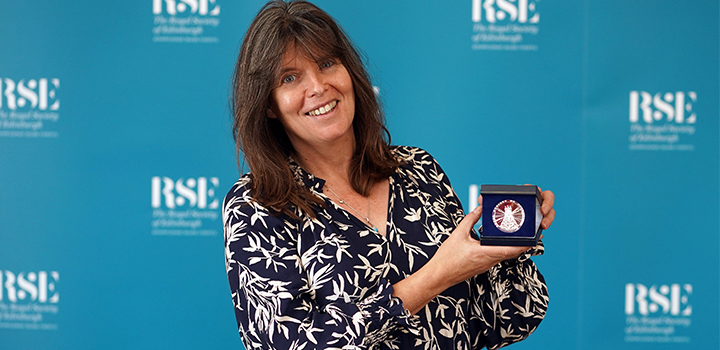The UEA researchers Making Peace with Nature
By: Communications

Researchers at the University of East Anglia have been part of a UN project to urgently solve planetary emergencies and secure humanity’s future.
A new report titled ‘Making Peace with Nature’ lays out the gravity of Earth’s triple environmental emergencies – climate change, biodiversity loss and pollution.
This UN Environment Programme (UNEP) report reveals how “our war on nature has left the planet broken”.
But it also shows how Covid-19 recovery plans are an unmissable opportunity to invest in nature and reach net zero emissions by 2050, and it reveals a blueprint to secure a sustainable future and prevent future pandemics.
The report assess the links between multiple environmental and development challenges, and explains how advances in science and bold policymaking can open a pathway towards the achievement of the Sustainable Development Goals by 2030 and a carbon neutral world by 2050, while bending the curve on biodiversity loss and curbing pollution and waste.
Taking that path means innovation and investment only in activities that protect both people and nature.
The research team say that success will include restored ecosystems and healthier lives as well as a stable climate.
Prof Sir Bob Watson FRS, from UEA’s School of Environmental Sciences, co-led the report. He has previously led major global environmental assessments including the Intergovernmental Panel on Climate Change (IPCC) and the Intergovernmental Science-Policy Platform for Biodiversity and Ecosystem Services (IPBES).
Prof Rachel Warren, from UEA’s School of Environmental Sciences, is also an author on the report. Her work focused on the effects of climate change on biodiversity and the interactions between climate change, land use and biodiversity.
She said: “There are three novel aspects to the report. The first is that it brings together the environmental problems of climate change, biodiversity loss, land degradation and pollution together.
“Secondly, it goes further than earlier reports by providing a solution to the problem, and being very clear about how various societal actors - governments, businesses, financial organisations, and individuals for example - can all be a part of that solution, with specific actions for each.
“Here, the benefit of looking at all these problems together becomes evident – many actions benefit more than one of these problems, yet there are some kinds of actions that might help with one problem whilst being very detrimental to another – so a holistic approach is needed to avoid perverse outcomes focused on one of these environmental problems only.
“Thirdly, and perhaps most importantly, it advocates a fundamental change in Man’s relationship with the environment – we need to put nature at the heart of all of our decision making, and work with nature to solve these problems.”
Amid a wave of investment to re-energize economies hit by the Covid-19 pandemic, the blueprint communicates the opportunity and urgency for ambitious and immediate action.
It also lays out the roles that everyone – from governments and businesses to communities and individuals – can and must play.
2021 is especially crucial, with upcoming climate and biodiversity convention meetings such as the UN Climate Change Conference of the Parties (COP26) which is due to be held in Glasgow later this year and the Conference of the Parties to the Convention on Biological Diversity (CBD COP15).
Tackling three planetary threats together
Economic growth has brought uneven gains in prosperity to a fast-growing global population, leaving 1.3 billion people poor, while tripling the extraction of natural resources to damaging levels and creating a planetary emergency.
Despite a temporary decline in emissions due to the pandemic, Earth is heading for at least 3°C of global warming this century. More than one million of the estimated eight million plant and animal species are at substantially increased risk of extinction. And diseases caused by pollution are currently killing some nine million people prematurely every year.
Environmental degradation is impeding progress towards ending poverty and hunger, reducing inequalities and promoting sustainable economic growth, work for all and peaceful and inclusive societies.
The report shows how this trio of environmental emergencies interact and have common causes, and thus can only be effectively addressed together.
Subsidies on fossil fuels, for instance, and prices that leave out environmental costs, are driving the wasteful production and consumption of energy and natural resources that are behind all three problems.
Released ahead of the fifth UN Environment Assembly, the report presents a strong case for why and how urgent action should be taken to protect and restore the planet and its climate in a holistic way. It presents examples of what transformative change can look like, and how it can create prosperity, employment and greater equality.
Reinforcing the call for action, the report stresses the need for stakeholders at all levels of society to be involved in decision-making, and identifies key actions that governments, businesses, communities and individuals can and should undertake in order to bring about a sustainable world.
A sustainable future also means learning from the Covid-19 crisis to reduce the threat of pandemic diseases. And the report underlines how ecosystem degradation heightens the risk of pathogens making the jump from animals to humans, and the importance of a ‘One Health’ approach that considers human, animal and planetary health together.
Related Articles

Prof Jenni Barclay honoured by the Royal Society of Edinburgh
Prof Jenni Barclay, Professor of Volcanology, has been honoured for her contributions to the emerging field of social volcanology by the Royal Society of Edinburgh with the James Hutton Medal.
Read more
Protect delicate polar ecosystems by mapping biodiversity
Polar regions contain vast, undiscovered biodiversity but are both the most-threatened and least-understood areas of the world.
Read more
Six UEA professors named in Highly Cited Researchers 2023 list
Six UEA professors have been named in the annual Highly Cited Researchers list for 2023, which celebrates some of the most influential researchers in the world today.
Read more